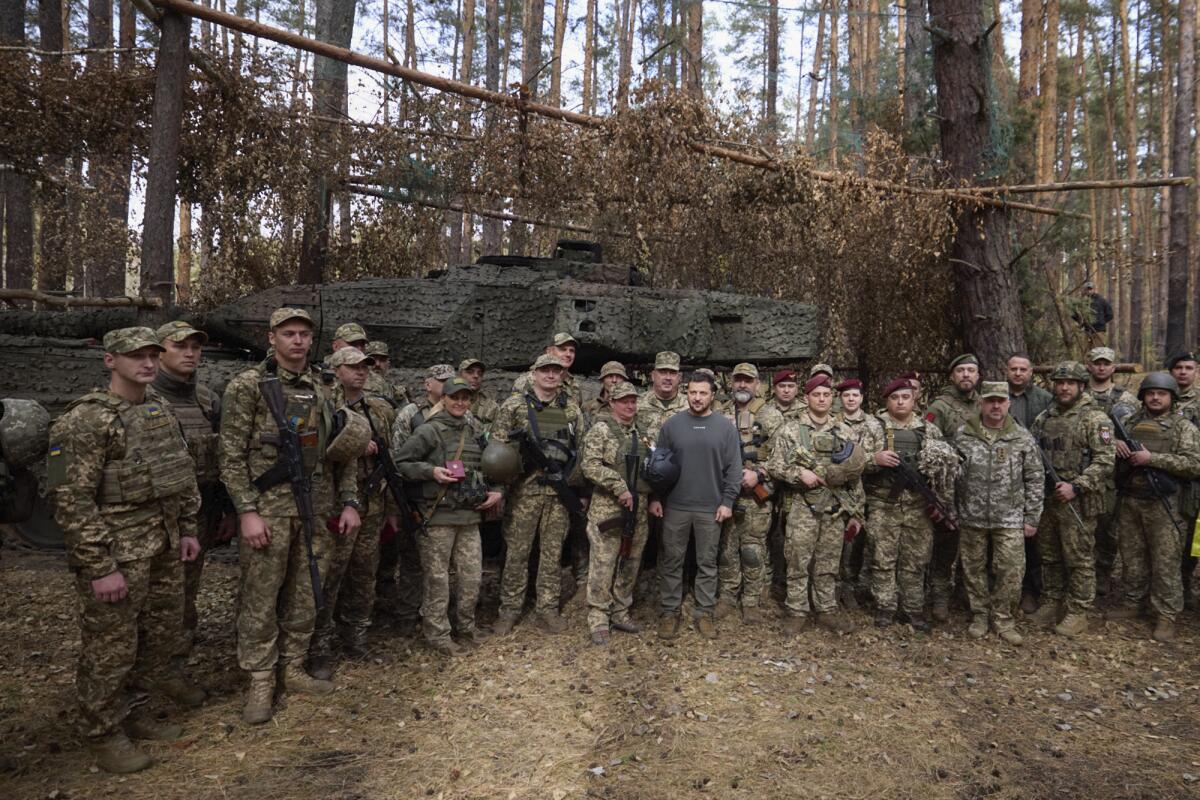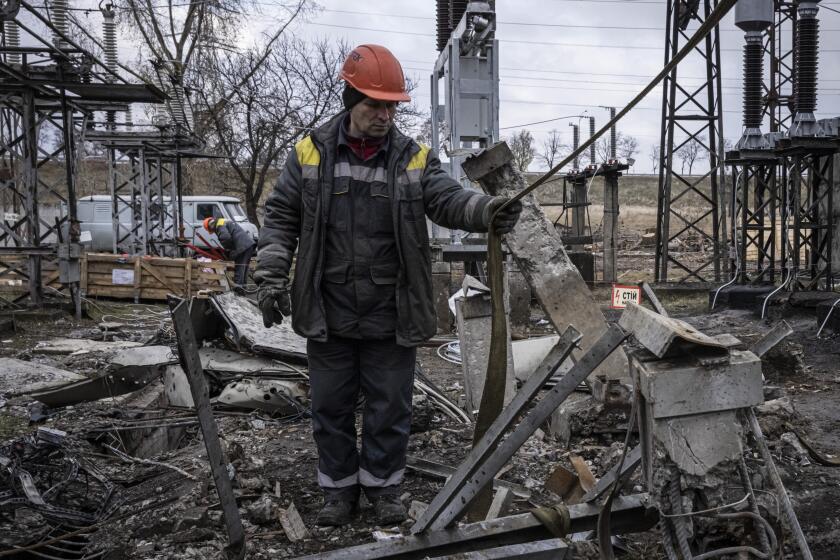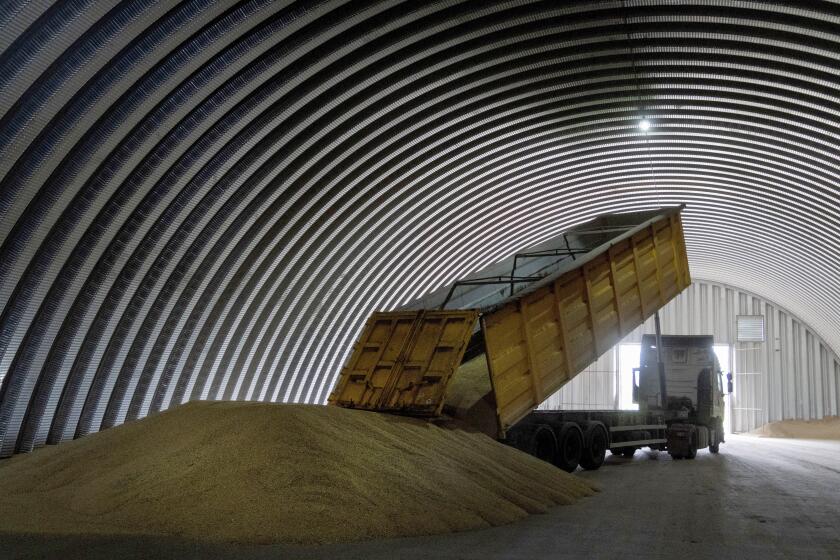Russia says it foiled major drone attack as concerns grow over Ukraine’s weapons supply

Russian air defenses shot down 31 Ukrainian drones in a nighttime attack on border regions, the Russian Defense Ministry said Wednesday, even as uncertainty grew over Ukraine’s future access to weapons and ammunition from its Western allies.
The drone attack appeared to be Kyiv’s largest single such cross-border assault reported by Moscow since it launched its invasion 20 months ago.
Ukraine is pressing on with a slow-moving counteroffensive launched three months ago, though mounting concerns about replenishing its military stocks cast a cloud over its efforts.
Dutch Adm. Rob Bauer, the head of NATO’s Military Committee, sounded the alarm about depleted stockpiles.
“The bottom of the barrel is now visible,” Bauer said of weapons systems and ammunition supplies as the war of attrition looks likely to continue through winter into next year.
He urged the defense industry to boost production “at a much higher tempo. And we need large volumes,” he told the Warsaw Security Forum, an annual conference, on Tuesday.
Russian attacks plunged Ukrainian cities into darkness last winter. War-weary citizens brace for more blackouts amid a rush to protect Ukraine’s electrical grid.
The Defense Ministry didn’t provide any evidence for its claims about intercepting Ukrainian drones nor any details about whether there was any damage or casualties.
It also said Russian aircraft thwarted a Ukrainian attempt to deploy a group of soldiers by sea to the western side of Russian-occupied Crimea.
The force attempted to land on Cape Tarkhankut, on Crimea’s western end, using a high-speed boat and three jet skis, the ministry said.
Moscow’s claims could not be independently verified, and Ukrainian officials made no immediate comment.
Ukraine, Poland and Lithuania agree on a plan to try to expedite Ukrainian grain exports, potentially benefiting needy countries beyond Europe.
The Crimean peninsula, which Russia illegally annexed from Ukraine in 2014, has been a frequent target of Kyiv’s attacks. The region has been the key hub supporting Russia’s invasion.
Fears over the resupply of Ukraine’s armed forces have deepened in recent weeks.
Bauer’s stark warning on depleted weapons stockpiles adds to mounting concerns over the resupply of Ukraine’s armed forces, which have deepened amid political turmoil in the U.S. and the unprecedented and dramatic ouster Tuesday of House Speaker Kevin McCarthy (R-Bakersfield).
The U.S. is by far Ukraine’s largest military supplier, but a faction in the House Republican majority, and many GOP voters, opposes sending more military aid to Ukraine.
A populist former prime minister and his leftist party have won parliamentary elections in Slovakia, staging a political comeback after campaigning on a pro-Russian and anti-American message
The Pentagon has warned Congress that it is running low on money to replace weapons the U.S. has sent to Ukraine.
Mykhailo Podolyak, an advisor to Ukrainian President Volodymyr Zelensky, publicly questioned the motives of what he called “Western conservative elites.”
“Why are you so insistently against ... destroying the Russian army, which has been terrifying,” he wrote on X, formerly Twitter.
The funding concerns prompted President Biden to hold a phone meeting Tuesday with allies in Europe, as well as the leaders of Canada and Japan, to coordinate support for Ukraine.
News Alerts
Get breaking news, investigations, analysis and more signature journalism from the Los Angeles Times in your inbox.
You may occasionally receive promotional content from the Los Angeles Times.
The call came three days after Biden signed legislation hastily sent to him by Congress that kept the federal government funded but left out billions in funding for Ukraine’s war effort that the White House had vigorously backed.
Meanwhile, sirens blared across Russia on Wednesday and television stations briefly interrupted regular broadcasts to air emergency warnings as part of nationwide drills that started on the previous day to test the readiness of the country’s emergency agencies.
Russian media said that the scenario of the drills envisioned the increasing danger of a conflict between nuclear powers and simulated action in response to a situation in which 70% of housing and all vital infrastructure are destroyed and wide areas are contaminated by a radioactive fallout.
The drills follow a series of warnings from Russian officials that Western support for Ukraine has increased the threat of a direct military conflict between Russia and the North Atlantic Treaty Organization.
More to Read
Sign up for Essential California
The most important California stories and recommendations in your inbox every morning.
You may occasionally receive promotional content from the Los Angeles Times.













